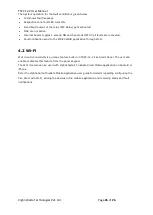
TSFC 12-2 User Manual
Vighnaharta Technologies Pvt. Ltd. Page
19
of
26
problems because of their sporadic nature. You may have a bigger problem than you think and
your system may be rendered ineffective because of it.
2. DON’T
let building occupants become apathetic to fire alarms
May be you have noticed this, but most people hesitate to respond when they hear the fire alarm
evacuation signals in a building. Unfortunately, most of us have experi
enced more than one “false
alarm” from a fire system in our lifetime and this has led many to be apathetic about evacuating.
Facility Managers must do what they can to avoid false alarms, but when they do happen take
steps to make whatever changes are necessary to prevent them in the future. When possible,
inform occupants about the source of each false alarm in hopes of maintaining their future
confidence in the system.
3. DON’T
cause an accidental discharge
Many facilities may have one or more spaces protected by an automatic fire extinguishing system.
Unfortunately, too many system owners have had to deal with an accidental discharge of a
system. Facility Managers must take steps to avoid this at all costs. Without question, the most
common reason for a
false discharge is human error. It’s important to put in place and enforce
procedures and policies that will minimize the chance for this sort of error. The single biggest
contributor to the prevention of accidental discharges is training the personnel who work in and
around these spaces.
4. DON’T
allow unqualified personnel to service your fire system
Facilities Managers must ensure those who are performing these tasks are trained on the
equipment they are servicing. The person working on FSS unit, must have through knowledge of
Fire Sprinkler, Fire Alarm and Special Hazard Fire Suppression. Facility Managers must not hesitate
to ask not only the service provider, but also the specific technician about their level of experience
in the type of work they are performing. The reliability of your life safety and business continuity
depends upon this person.
5. DON’T
forget to consider the fire system when your facility
changes
One thing is for certain, your building will eventually change and each time it does the Facility
Manager must not forget to evaluate the impact those changes will have on the fire systems
protecting the building. Other types of fire systems and components will no doubt be impacted
including detector placement, notification appliance location, sprinkler coverage and obstructions
to manual pull stations. When you realize your building will be undergoing a change, begin
planning up-front for the necessary changes to the fire systems.






















